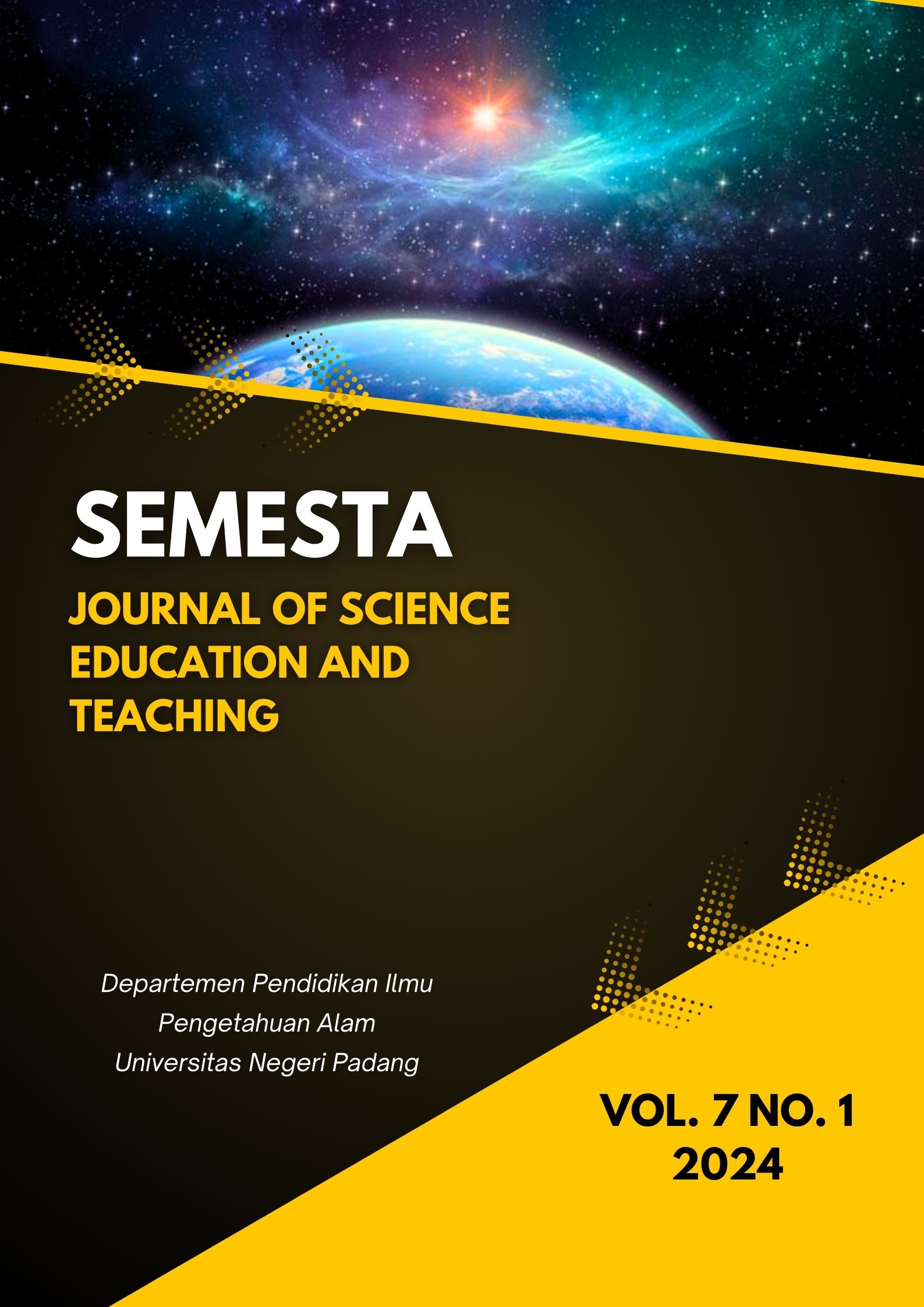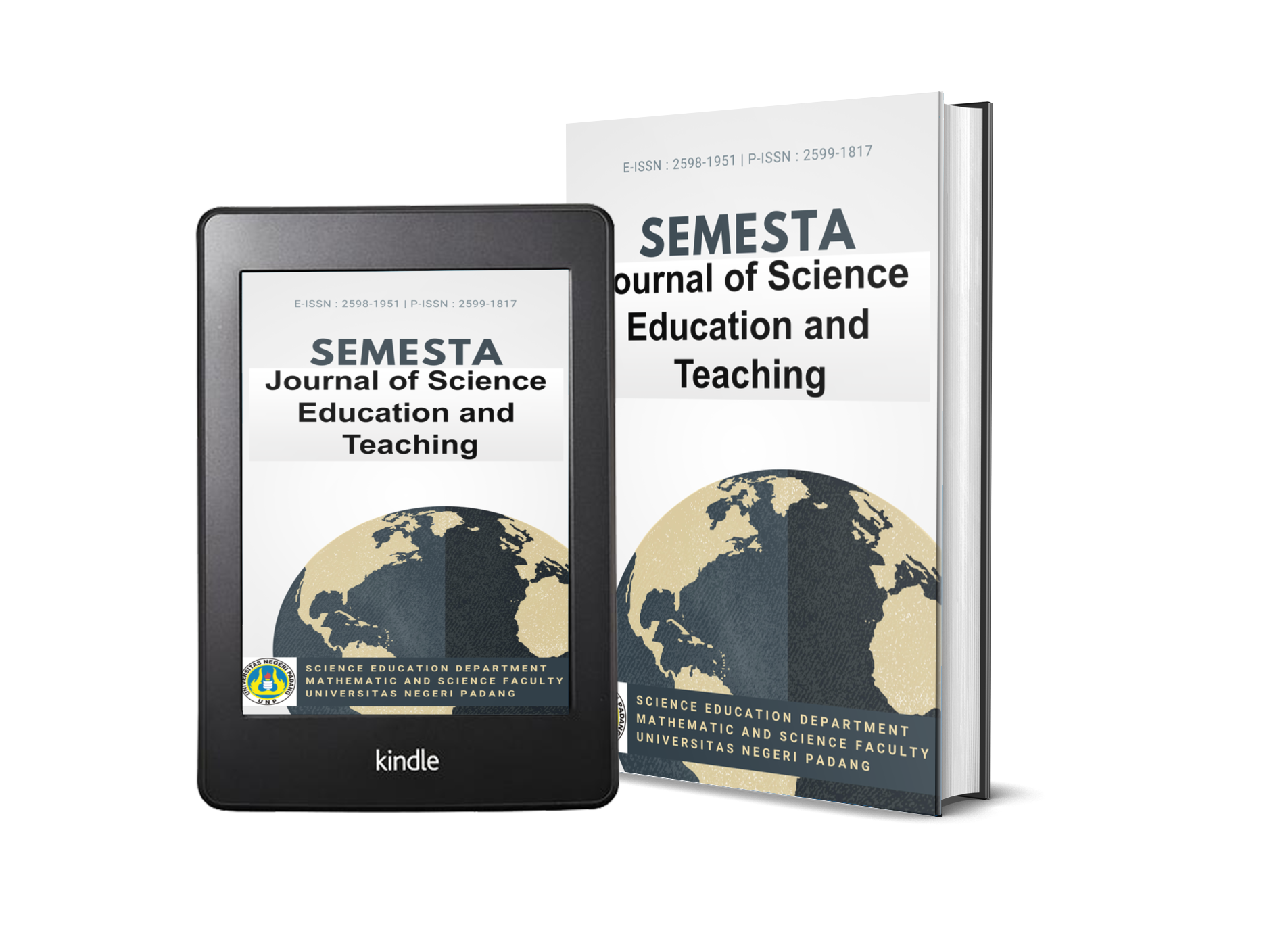THE EFFECT OF PROBLEM-BASED LEARNING ASSISTED WITH PHET SIMULATION ON STUDENTS’ LEARNING OUTCOMES OF LIGHT AND OPTICAL DEVICES OPTICS TOPIC
DOI:
https://doi.org/10.24036/semesta/vol7-iss1/277Keywords:
Problem based learning, phet, learning outcomesAbstract
This research is based on the preliminary study conducted at SMPN 16 Padang which found that students' learning outcomes in science teaching are still considered suboptimal. This is indicated by several students' scores that have not yet met the Learning Outcome Completion Criteria of 80. This research aims to determine the effect of Problem-Based Learning (PBL) model assisted by PhET simulations on the learning outcomes of eighth-grade students at SMPN 16 Padang. The type of research is a quasi-experiment with a non-equivalent control group design. The population in this study is all the eighth-grade students of SMPN 16 Padang. Sample collection was conducted using purposive sampling techniques. Thus, the research samples were obtained from students in class VIII 2 and VIII 4. The research samples consisted of experimental class applying the Problem-Based Learning model assisted by PhET simulations and control class using the conventional learning model. Data collection was conducted through tests administered before (pretest) and after the treatment (posttest) on the experimental and control classes in the form of multiple-choice questions. The obtained data were analyzed using inferential statistical analysis, and the results of the two-sample t-test for the pre-test and N-gain were 0.002 for the pre-test significance and 0.000 for the N-Gain significance, which means was rejected or there was a significant difference between the two groups because the significance value (p) was less than 0.05. Thus, it can be concluded that there is a significant influence of the application of the PBL learning model assisted by PhET simulations on the learning outcomes of eighth-grade students in the subject of light and optical instruments.
References
Apriwahyuni, R., Yunus, S. R., & Wahyuni, D. (2021). Penerapan Model Pembelajaran Problem Based Learning (PBL) Menggunakan Media Simulasi PhET untuk Meningkatkan Hasil Belajar IPA Peserta Didik. Jurnal Profesi Kependidikan, 2(1), 89–100. https://ojs.unm.ac.id/JPK/article/view/27386/13616
Arends, R. I. (2008). Learning to teach. Pustaka Pelajar.
BSNP. (2010). Paradigma Pendidikan Nasional Abad XXI. Paradigma Pendidikan Nasional Abad XXI, 1–59.
Fakhriyah, F. (2014). Penerapan problem based learning dalam upaya mengembangkan kemampuan berpikir kritis mahasiswa. Jurnal Pendidikan IPA Indonesia, 3(1), 95–101. https://doi.org/10.15294/jpii.v3i1.2906
Handayani, S., Listyarini, I., Saputro, B. A., & Miyarti. (2023). Pengaruh Model Pembelajaran Problem Based Learning terhadap Hasil Belajar IPAS Siswa Kelas IV SDN Sawah Besar 01. Jurnal on Education, 05, 12518–12526. https://doi.org/https://doi.org/10.31004/joe.v5i4.2237
Khoirurrijal, Fadriati, Sofia, Anisa Dwi Makrufi, S. G., Muin, A., Tajeri, Fakhrudin, A., Hamdani, & Suprapno. (2022). Pengembangan Kurikulum Merdeka. In Jurnal Penelitian Pendidikan Guru Sekolah Dasar (Vol. 6, Issue August).
Muzana, S. R., Lubis, S. P. W., & Wirda. (2021). Penggunaan Simulasi PhET terhadap Efektivitas Belajar IPA. Jurnal Dedikasi Pendidikan, 5(1), 227–236. http://jurnal.abulyatama.ac.id/index.php/dedikasi
Ndihokubwayo, K., Uwamahoro, J., & Ndayambaje, I. (2020). Effectiveness of PhET Simulations and YouTube Videos to Improve the Learning of Optics in Rwandan Secondary Schools. African Journal of Research in Mathematics, Science and Technology Education, 24(2), 253–265. https://doi.org/10.1080/18117295.2020.1818042
Novita, N., S, I. T. A., & Fatmi, N. (2023). Pengaruh Model Pembelajaran PBL dengan Media PhET Terhadap Hasil Belajar Kognitif Siswa. Journal on Education, 5(3), 6092–6100. https://doi.org/10.31004/joe.v5i3.1375
Nurhayati, N., Fadilah, S., & Mutmainah, M. (2014). Penerapan Metode Demonstrasi Berbantu Media Animasi Software Phet Terhadap Hasil Belajar Siswa Dalam Materi Listrik Dinamis Kelas X Madrasah Aliyah Negeri 1 Pontianak. Jurnal Penelitian Fisika Dan Aplikasinya (JPFA), 4(2), 1. https://doi.org/10.26740/jpfa.v4n2.p1-7
Saputra, R., Susilawati, S., & Verawati, N. N. S. P. (2020). Pengaruh Penggunaan Media Simulasi Phet (Physics Education Technology) Terhadap Hasil Belajar Fisika. Jurnal Pijar Mipa, 15(2), 110–115. https://doi.org/10.29303/jpm.v15i2.1459
Sugiyono. (2019). Metode Penelitian Pendidikan (Pendekatan Kuantitatif, Kualitatif, dan R&D). ALFABETA.
Sujanem, R., Sutarno, E., & Gunadi, I. G. A. (2019). Pelatihan dan Pendampingan Pembuatan Media Simulasi Praktikum IPA SMP dengan Program Simulasi Phet. International Journal of Community Service Learning, 3(1), 11–17. https://doi.org/https://doi.org/10.23887/ijcsl.v3i1.17485
Sulistyani, N., & Retnawati, H. (2015). Pengembangan perangkat pembelajaran bangun ruang di SMP dengan pendekatan problem-based learning. Jurnal Riset Pendidikan Matematika, 2(2), 197–210. https://doi.org/10.21831/jrpm.v2i2.7334
Suryaman, M. (2020). Pengembangan Kurikulum Merdeka Belajar Program Studi Pendidikan Bahasa Indonesia. Prosiding Seminar Daring Nasional : Pengembangan Kurikulum Merdeka Belajar, 13–28.
Syahril, S. (2018). Peningkatan Hasil Belajar IPA dengan Menggunakan Pendekatan Konstruktivisme Pada Siswa Kelas VI SD Negeri 21 Batang Anai. JRTI (Jurnal Riset Tindakan Indonesia), 3(1), 34. https://doi.org/10.29210/3003126000
Trianto. (2007). Model Pembelajaran Terpadu dalam Teori dan Praktek (J. Wolor (ed.)). Prestasi Pustaka.
Zahara, S., Yusrizal, Y., & Rahwanto, A. (2015). Pengaruh Penggunaan Media Komputer Berbasis Simulasi Physics Education Technology (PhET) Terhadap Hasil Belajar Dan Keterampilan Berfikir Krtis Siswa Pada Materi Fluida Statis. Jurnal Pendidikan Sains Indonesia, 3(1), 251–258.

Downloads
Published
How to Cite
Issue
Section
License
Copyright (c) 2024 Fathia Zahra, Rani Oktavia, Aulia Azhar, Aulia Azhar, Khairil Arif, Monica Prima Sari

This work is licensed under a Creative Commons Attribution 4.0 International License.





